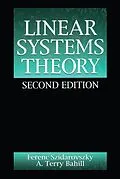This second edition comprehensively presents important tools of linear systems theory, including differential and difference equations, Laplace and Z transforms, and more.
Linear Systems Theory discusses:
The book focuses mainly on applications in electrical engineering, but it provides examples for most branches of engineering, economics, and social sciences.
What's New in the Second Edition?
Although more mainstream than its predecessor, this revision maintains the rigorous mathematical approach of the first edition, providing fast, efficient development of the material.
Linear Systems Theory enables its reader to develop his or her capabilities for modeling dynamic phenomena, examining their properties, and applying them to real-life situations.
Autorentext
Szidarovszky, Ferenc
Inhalt
Preface. Introduction. Mathematical Background. Mathematics of Dynamic Processes. Characterization of Linear and Nonlinear Systems. Stability Analysis. Controllability. Observability. Canonical Forms. Realizability. Estimation and Design. Advanced Topics. References. Appendix. Index.
Catalog no. 8013
1992, 448 pp., ISBN: 0-8493-8013-8
U.S. $59.95/Outside U.S. $72.00
Titel
Linear Systems Theory
EAN
9781351435208
Format
PDF
Hersteller
Veröffentlichung
03.05.2018
Digitaler Kopierschutz
Adobe-DRM
Anzahl Seiten
528
Unerwartete Verzögerung
Ups, ein Fehler ist aufgetreten. Bitte versuchen Sie es später noch einmal.
